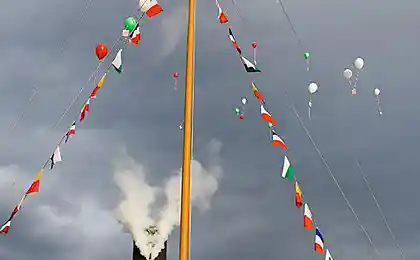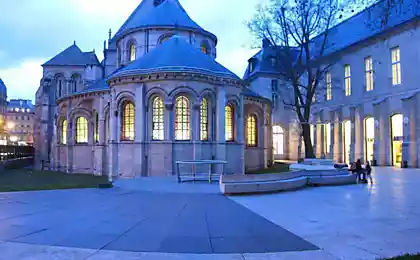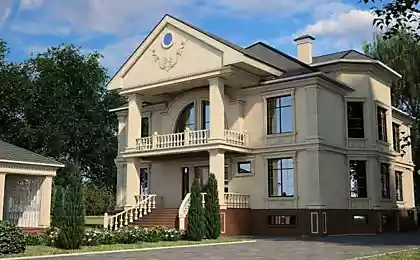867
The most unusual scientific construction
SuperKamiokande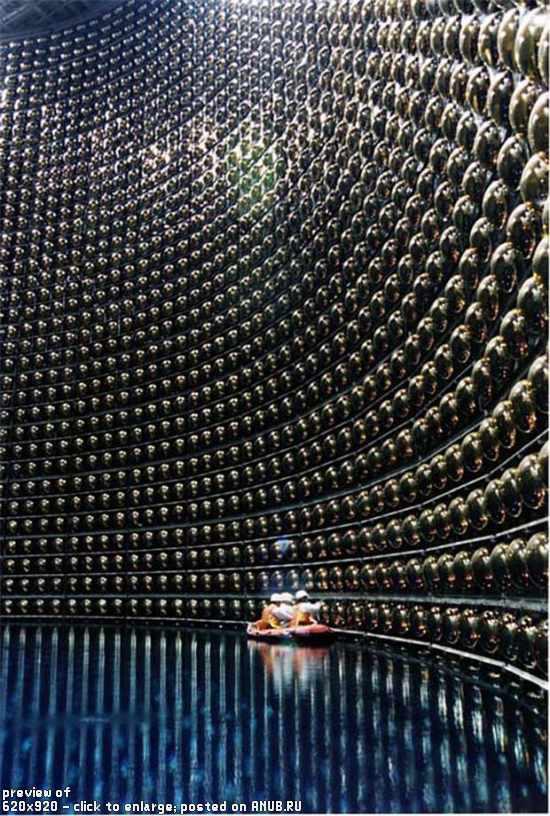
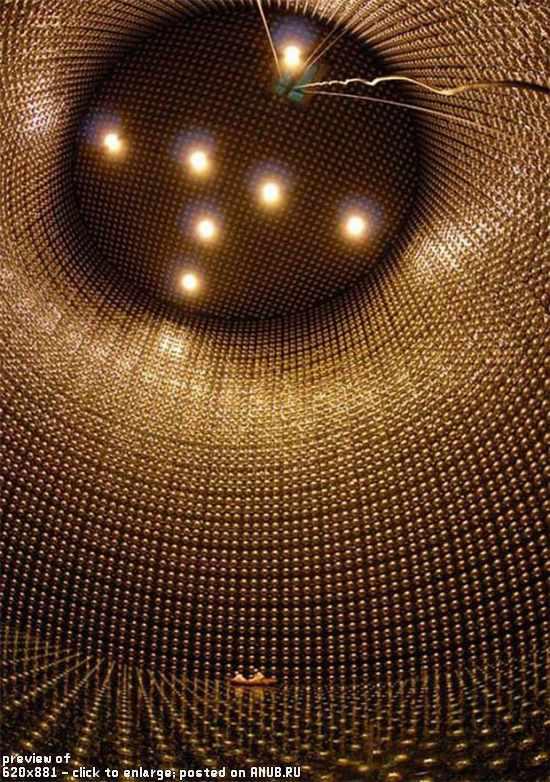
SuperKamiokande, is the modernization of Kamiokande-II, is located in the mountains of Japan, at a depth of 1 km below ground.
His detector - a huge reservoir (40x40 m) stainless steel, filled with 50,000 tons of pure water, which serves as a target for neutrinos. On the surface reservoir with 11,146 photomultiplier tubes (PMTs). Inside the detector that is used for physics research, surrounded by a layer of ordinary water, which is called an external detector and the photomultipliers also controlled to prevent the core detector any neutrino detector produced in the surrounding rock. In addition to the light collector and a huge amount of water, electronics, computers, calibration devices and water treatment equipment installed in or near the detector.
In 1998, participants in the experiment SuperKamiokande announced registration of phenomena similar to neutrino oscillations. During the experiment, the number of muon neutrinos produced in the upper layers of Earth's atmosphere, the collision of cosmic-ray protons with nuclei of air coming into the detector from different distances. It turned out that fewer muon neutrinos come from those areas where the neutrinos travel long distances. These results give reason to believe that the number of neutrinos of this class depends on the path traveled by them, which may be a consequence of the transformation of neutrinos from one type to another.
Cosmic-ray protons in a collision with an atom give rise to a charged pion that decays into a muon and muon neutrino.
Benefield Anechoic Facility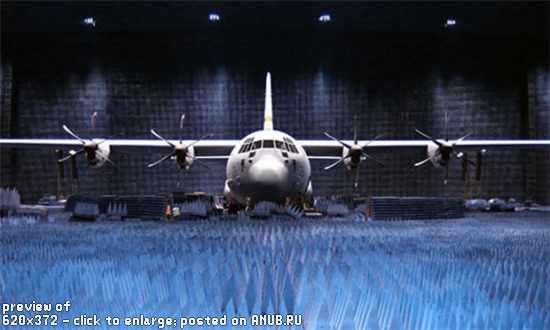
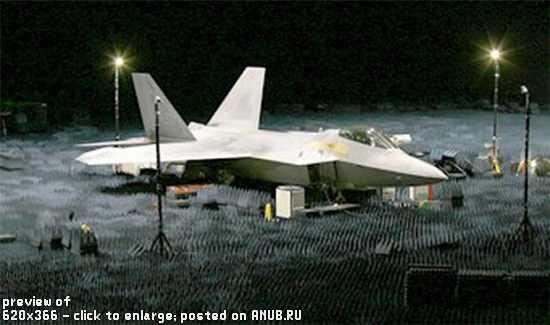
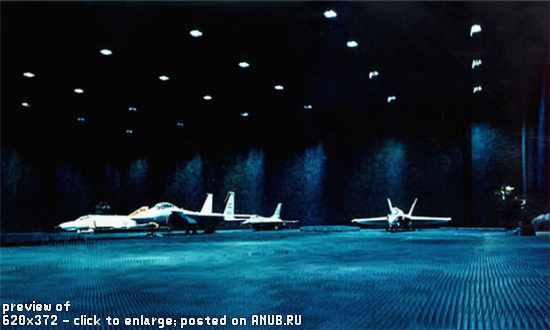
In an anechoic chamber antenna range Benefield BAF (Benefield Anechoic Facility, Edwards Air Force Base, CA) were tested hypersonic demonstrator X-43A equipped with a ramjet engine with supersonic combustion (SPVRD). With an anechoic chamber investigated parameters such as the effective reflective / absorbing surface and the exact characteristics of the antenna device objects tested different types of avionics, including radio, weapon control systems and electronic countermeasures means containers.
Camera landfill BAF - the biggest in the world. Its dimensions (80h76h21 m) (*) allow you to experience here object the size of B-52 bombers and military transport aircraft C-17. X-43A 3.7 m length was the smallest object tested in the chamber. There were tested telemetry transmitter demonstrator, working in a range of S, and the transponder antenna range C.
The z machine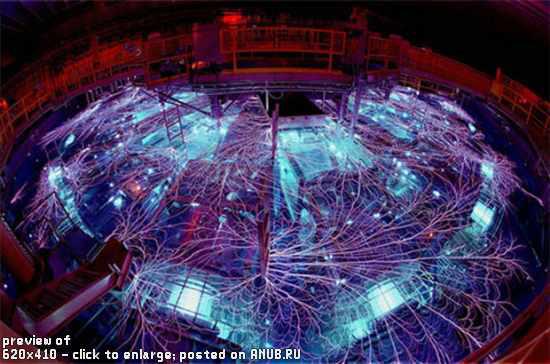
Z machine, represents a particular particle accelerator and a powerful X-ray generator, which was set up to simulate the conditions of a nuclear explosion. The authors of the experiment can not yet explain how they were able to achieve this unique result.
For comparison, the temperature of the inner regions of the sun is about 15 million degrees, and the temperature, which were achieved during experiments on nuclear fusion does not exceed 500 million degrees.
Typically, for a high-temperature plasma in the ultrashort pulses passed electric current force of 20 million amperes through the finest tungsten wire. In the experiments, tungsten was used instead of steel, and with this, scientists are trying to link the result. Surprising is the fact that in the course of the experiment to allocate more energy than it is supplied to it. This suggests that there began to operate previously unknown processes of energy generation. But all this is waiting for its definitive explanation.
Very large array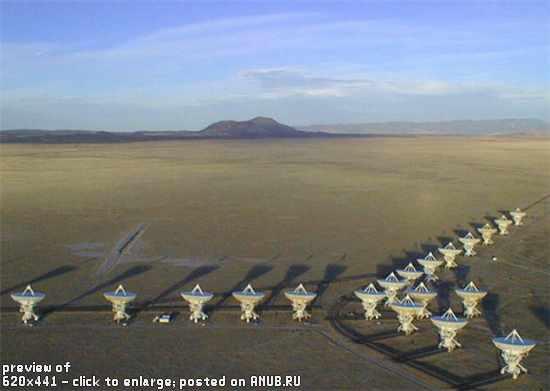
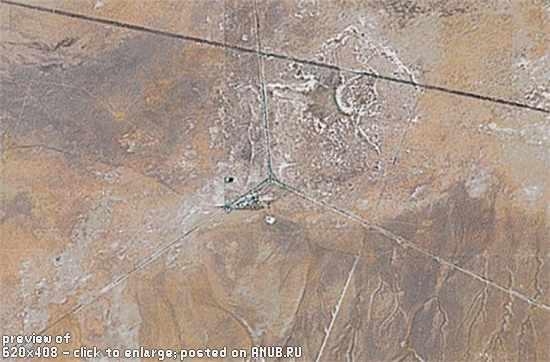
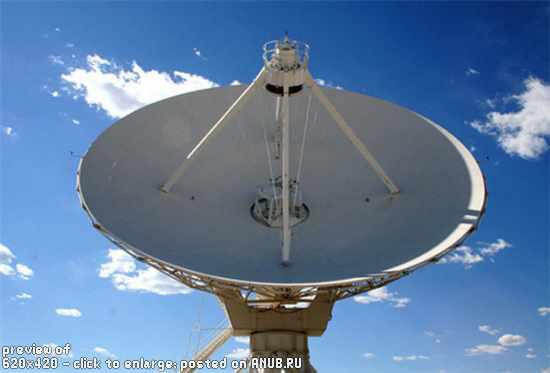
Very Large Array (VLA) - Radio Astronomical Observatory, which is located 80 km west of Socorro, New Mexico (Socorro, New Mexico).
It is located at an altitude of 2124 meters above sea level. It consists of 27 independent radio antennas each 25 meters in diameter and weighs 230 tons. All are located on the sides, resembling the letter Y, which is 21 kilometers in length on each side. Using the rail road, move the antenna to the desired position for observation.
All of this used in international programs to search for extraterrestrial life using radio waves. It was caught by these antennas known signal Wow.
Large hadron collider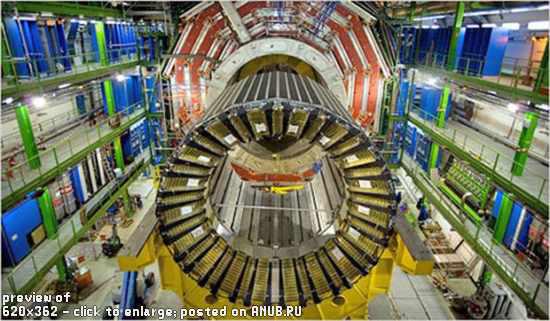
The Large Hadron Collider (Eng. LHC, Large Hadron Collider), currently under construction at the European Center for Nuclear Research CERN (Centre Europeen de Recherche Nucleaire) efforts of physicists around the world, the accelerator is designed to accelerate protons and heavy ions. The goal of the LHC project is primarily the discovery of the Higgs boson - the last undiscovered particle experimentally the Standard Model (SM) - and the search for physics beyond the SM. Also, great attention will be paid to research the properties of W and Z-bosons, nuclear interactions at very high energies, the processes of production and decay of heavy quarks (b and t).
The idea of the LHC project was born in 1984 and was officially approved ten years later. Construction LHC started in 2001 after the end of the previous big accelerator of CERN - electron-positron collider LEP (Large Electron-Positron Collider).
At the LHC is expected to push the protons with a total energy of 14 TeV (ie 14 teraelectronvolt or 14 × 1012 electronvolts) in the center of mass of the incoming particles, as well as the core lead with an energy of 5, 5 GeV (ie, 5, 5 x 109 eV) for the each pair of colliding nucleons.
Large Hadron Collider being built in an existing tunnel, which was formerly occupied LEP. The tunnel with a perimeter of 26, 7 km laid at a depth of about one hundred meters in France and Switzerland. To retain and correction of proton beams used 1624 superconducting magnets, whose total length exceeds 22 km. The last one has been installed in the tunnel 27 November 2006. The magnets will operate at a temperature of -271 ° C. Construction of a special line for the cryogenic cooling of the magnets ended November 19, 2006.
The first test of collision with an energy of 900 GeV (the so-called Commission Run) should be held in the summer of 2008. Note that the energy of the colliding beams at the time of Commission Run will be two times lower than the energy of the center of mass collider Tevatron. At the end of 2008 the output energy of 7 TeV, and then - to achieve design energy of 14 TeV.
After starting the LHC will be the most high-energy particle accelerator in the world, almost an order of magnitude of the energy of its nearest competitors - a proton-antiproton collider Tevatron, which is currently working at the National Accelerator Laboratory. Enrico Fermi (USA) and the relativistic heavy ion collider RHIC, working at Brookhaven National Laboratory (USA).
LHC luminosity during the Commission Run will be only 1029 particles / cm2 · s. This is a very modest figure. However, after the LHC start-up for the experimental studies luminosity will gradually rise from an initial 5 x 1032 particles / cm2 with up to par 1, 7 × 1034 particles / cm2 with that order of magnitude corresponds to luminosity modern B-factories BaBar (SLAC, USA ) and Belle (KEK, Japan). The yield on the nominal luminosity is planned in 2010.
Treadmill for racing avto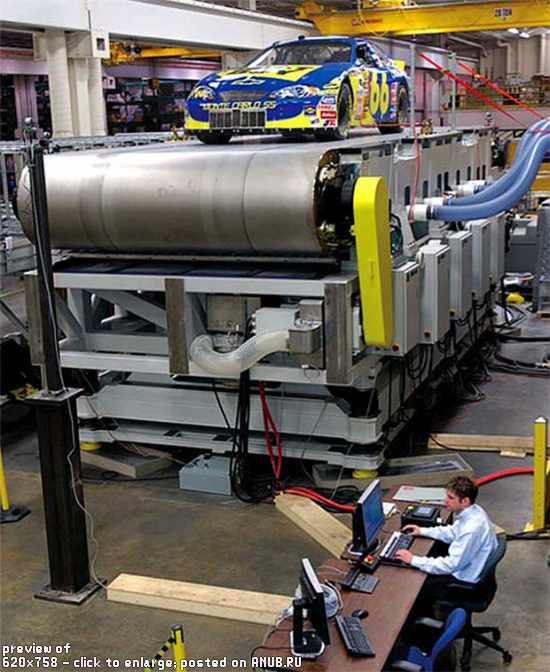
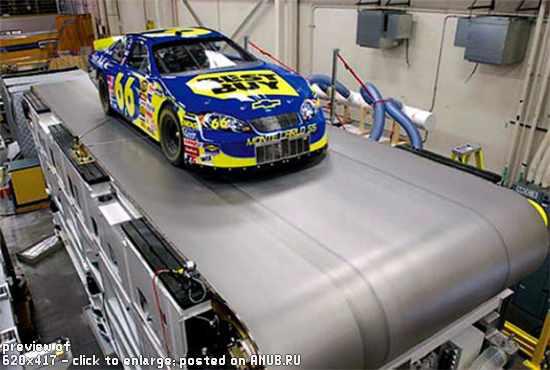
American kompaniya Jacobs Engineering postroila unique running dorozhku on kotoroy mozhet bolshey tested nor no less, and gonochny bolid chempionata NASCAR. This will be part of moschnoy dorozhka aerodinamicheskoy pipe stoimostyu $ 40 millionov, vozvodimoy now Konkord gorode.
[First in Severnoy America "sportivnaya" aerodinamicheskaya pipe begovoy dorozhkoy (and odna of nemnogih in the world, kotoraya pozvolit Very tochno modelirovat potoki pod head on Very vysokih skorostyah) sooruzhaetsya for kompanii WindShear - dochernego enterprise promyshlennogo stankostroitelnogo giant Haas Automation, kotorym owns millioner Gene Haas (Gene Haas).
The tower height of 173 meters to test liftov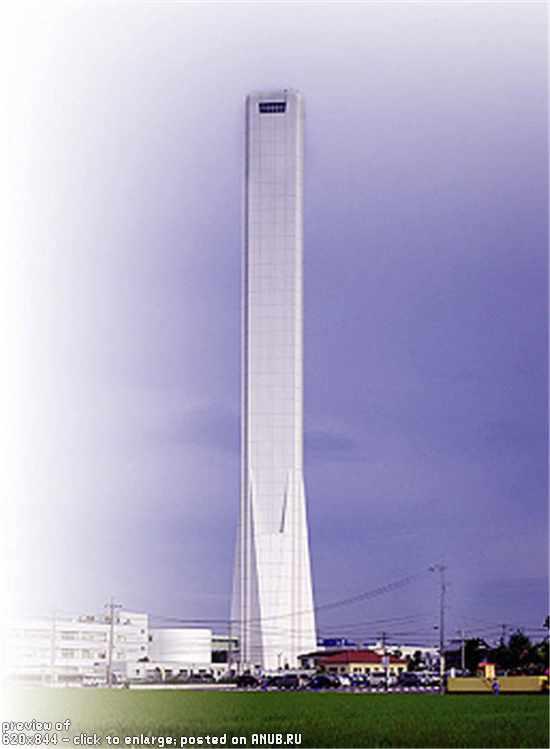
Mitsubishi Electric Corporation of Japan built in the city Inazava the world's highest tower for testing lifts height of 173 meters. Go for the construction of a giant skyscraper corporation made recently appeared in fashion for the construction of ultra-high buildings. The skyscraper Taiwanese capital of Taipei 101 speed of the elevators has reached 61 km / h.
Construction of the tower cost Solae Mitsubishi Electric in five billion yen (about 50 million. Dollars)


SuperKamiokande, is the modernization of Kamiokande-II, is located in the mountains of Japan, at a depth of 1 km below ground.
His detector - a huge reservoir (40x40 m) stainless steel, filled with 50,000 tons of pure water, which serves as a target for neutrinos. On the surface reservoir with 11,146 photomultiplier tubes (PMTs). Inside the detector that is used for physics research, surrounded by a layer of ordinary water, which is called an external detector and the photomultipliers also controlled to prevent the core detector any neutrino detector produced in the surrounding rock. In addition to the light collector and a huge amount of water, electronics, computers, calibration devices and water treatment equipment installed in or near the detector.
In 1998, participants in the experiment SuperKamiokande announced registration of phenomena similar to neutrino oscillations. During the experiment, the number of muon neutrinos produced in the upper layers of Earth's atmosphere, the collision of cosmic-ray protons with nuclei of air coming into the detector from different distances. It turned out that fewer muon neutrinos come from those areas where the neutrinos travel long distances. These results give reason to believe that the number of neutrinos of this class depends on the path traveled by them, which may be a consequence of the transformation of neutrinos from one type to another.
Cosmic-ray protons in a collision with an atom give rise to a charged pion that decays into a muon and muon neutrino.
Benefield Anechoic Facility



In an anechoic chamber antenna range Benefield BAF (Benefield Anechoic Facility, Edwards Air Force Base, CA) were tested hypersonic demonstrator X-43A equipped with a ramjet engine with supersonic combustion (SPVRD). With an anechoic chamber investigated parameters such as the effective reflective / absorbing surface and the exact characteristics of the antenna device objects tested different types of avionics, including radio, weapon control systems and electronic countermeasures means containers.
Camera landfill BAF - the biggest in the world. Its dimensions (80h76h21 m) (*) allow you to experience here object the size of B-52 bombers and military transport aircraft C-17. X-43A 3.7 m length was the smallest object tested in the chamber. There were tested telemetry transmitter demonstrator, working in a range of S, and the transponder antenna range C.
The z machine

Z machine, represents a particular particle accelerator and a powerful X-ray generator, which was set up to simulate the conditions of a nuclear explosion. The authors of the experiment can not yet explain how they were able to achieve this unique result.
For comparison, the temperature of the inner regions of the sun is about 15 million degrees, and the temperature, which were achieved during experiments on nuclear fusion does not exceed 500 million degrees.
Typically, for a high-temperature plasma in the ultrashort pulses passed electric current force of 20 million amperes through the finest tungsten wire. In the experiments, tungsten was used instead of steel, and with this, scientists are trying to link the result. Surprising is the fact that in the course of the experiment to allocate more energy than it is supplied to it. This suggests that there began to operate previously unknown processes of energy generation. But all this is waiting for its definitive explanation.
Very large array



Very Large Array (VLA) - Radio Astronomical Observatory, which is located 80 km west of Socorro, New Mexico (Socorro, New Mexico).
It is located at an altitude of 2124 meters above sea level. It consists of 27 independent radio antennas each 25 meters in diameter and weighs 230 tons. All are located on the sides, resembling the letter Y, which is 21 kilometers in length on each side. Using the rail road, move the antenna to the desired position for observation.
All of this used in international programs to search for extraterrestrial life using radio waves. It was caught by these antennas known signal Wow.
Large hadron collider

The Large Hadron Collider (Eng. LHC, Large Hadron Collider), currently under construction at the European Center for Nuclear Research CERN (Centre Europeen de Recherche Nucleaire) efforts of physicists around the world, the accelerator is designed to accelerate protons and heavy ions. The goal of the LHC project is primarily the discovery of the Higgs boson - the last undiscovered particle experimentally the Standard Model (SM) - and the search for physics beyond the SM. Also, great attention will be paid to research the properties of W and Z-bosons, nuclear interactions at very high energies, the processes of production and decay of heavy quarks (b and t).
The idea of the LHC project was born in 1984 and was officially approved ten years later. Construction LHC started in 2001 after the end of the previous big accelerator of CERN - electron-positron collider LEP (Large Electron-Positron Collider).
At the LHC is expected to push the protons with a total energy of 14 TeV (ie 14 teraelectronvolt or 14 × 1012 electronvolts) in the center of mass of the incoming particles, as well as the core lead with an energy of 5, 5 GeV (ie, 5, 5 x 109 eV) for the each pair of colliding nucleons.
Large Hadron Collider being built in an existing tunnel, which was formerly occupied LEP. The tunnel with a perimeter of 26, 7 km laid at a depth of about one hundred meters in France and Switzerland. To retain and correction of proton beams used 1624 superconducting magnets, whose total length exceeds 22 km. The last one has been installed in the tunnel 27 November 2006. The magnets will operate at a temperature of -271 ° C. Construction of a special line for the cryogenic cooling of the magnets ended November 19, 2006.
The first test of collision with an energy of 900 GeV (the so-called Commission Run) should be held in the summer of 2008. Note that the energy of the colliding beams at the time of Commission Run will be two times lower than the energy of the center of mass collider Tevatron. At the end of 2008 the output energy of 7 TeV, and then - to achieve design energy of 14 TeV.
After starting the LHC will be the most high-energy particle accelerator in the world, almost an order of magnitude of the energy of its nearest competitors - a proton-antiproton collider Tevatron, which is currently working at the National Accelerator Laboratory. Enrico Fermi (USA) and the relativistic heavy ion collider RHIC, working at Brookhaven National Laboratory (USA).
LHC luminosity during the Commission Run will be only 1029 particles / cm2 · s. This is a very modest figure. However, after the LHC start-up for the experimental studies luminosity will gradually rise from an initial 5 x 1032 particles / cm2 with up to par 1, 7 × 1034 particles / cm2 with that order of magnitude corresponds to luminosity modern B-factories BaBar (SLAC, USA ) and Belle (KEK, Japan). The yield on the nominal luminosity is planned in 2010.
Treadmill for racing avto


American kompaniya Jacobs Engineering postroila unique running dorozhku on kotoroy mozhet bolshey tested nor no less, and gonochny bolid chempionata NASCAR. This will be part of moschnoy dorozhka aerodinamicheskoy pipe stoimostyu $ 40 millionov, vozvodimoy now Konkord gorode.
[First in Severnoy America "sportivnaya" aerodinamicheskaya pipe begovoy dorozhkoy (and odna of nemnogih in the world, kotoraya pozvolit Very tochno modelirovat potoki pod head on Very vysokih skorostyah) sooruzhaetsya for kompanii WindShear - dochernego enterprise promyshlennogo stankostroitelnogo giant Haas Automation, kotorym owns millioner Gene Haas (Gene Haas).
The tower height of 173 meters to test liftov

Mitsubishi Electric Corporation of Japan built in the city Inazava the world's highest tower for testing lifts height of 173 meters. Go for the construction of a giant skyscraper corporation made recently appeared in fashion for the construction of ultra-high buildings. The skyscraper Taiwanese capital of Taipei 101 speed of the elevators has reached 61 km / h.
Construction of the tower cost Solae Mitsubishi Electric in five billion yen (about 50 million. Dollars)











